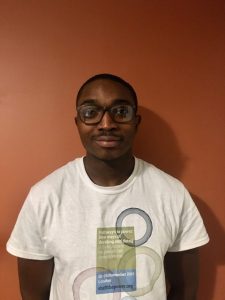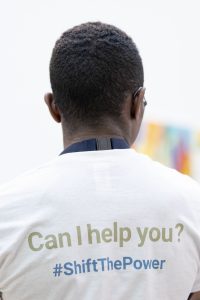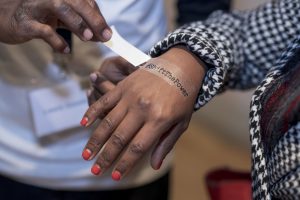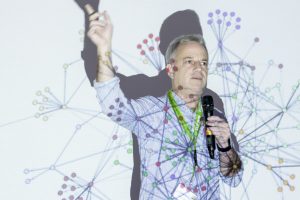Solutions, actions and temporary tattoos – my time volunteering at the Pathways to Power Symposium
03 Dec 2019

Lewis Goode, Pathways to Power Symposium volunteer and third year BA International Economics and Trade student at Coventry University
I think that some people don’t see the value in volunteering, as it may seem counter-intuitive to work without payment. But I massively disagree: volunteering is work without monetary payment but, trust me, payment is surely received. This is how I felt about my time volunteering at the GFCF’s two-day Pathways to Power Symposium in Central London. The event brought together global change-makers and saw them discuss how to change the “flawed structures” in the development sector, as described by Rita Thapa (founder of Tewa and Chair of the GFCF) referencing how development organizations often try to solve issues in the Global South with solutions curated in the Global North. As one participant at the Symposium observed: “We are playing jigsaw with people who are playing chess.” (Check out this article for more background on the #ShiftThePower movement behind the Symposium.)
Two days to work out how to challenge a development culture that has been in place for decades, and to come up with alternative solutions that take into account different cultures and the complex, multi-faceted nature of today’s problems, may seem to be an impossible feat, but the Symposium set out to do just that. With attendees arriving to Central London from what felt to be every corner of the globe, each greeted with the offer of a temporary tattoo, the Symposium and the grand challenge assigned to it commenced.
The first day saw me begin my volunteer role as a fly-on-the-wall and thus I invite you to join me as I recall my highlights from this experience. Early into the Symposium, we were introduced to the concept of Root Change’s community mapping tool, Pando, which maps out the networks and communities that we operate in, allowing us to gain insight into how connected (or not) we are across a system. I found this particularly interesting as it reminded me to remain open-minded, challenge my own beliefs and embrace the views of others.
Shortly after, attendees broke off into group discussions to describe their “first memories of money” and I was blessed and bamboozled to hear stories like that of hyperinflation in 90’s Serbia, which literally turned billions of dinar into nearly nothing, as one of the attendees shared. After discussing experiences with money (in my group one participant referred to money as a tool for social change, while another remembered having money as a prop in their dollhouse as a child) it became clear to me that money is not the only asset that can be used to create change, and we must look to the value of the other tools we have, such as knowledge, experience and social capital. And when we do use money as a tool for change, we must not fund based on perceived victim-hood, but rather should sustainably fund organizations and their work (via multi-year flexible funding, for example) who are really allowing the light to shine from the Global South, because trust me, it’s there.
One key thing that I loved about the narrative of the Symposium was the emphasis on action and solutions. Most people won’t hesitate when reeling off “what’s wrong with the world”, but only certain people will stand up and do something about it – for me, it simply boils down to if you want to be a talker or a do-er? The time for armchair activism is over. We all have a choice of which side of history we want to be on and those at the #ShiftThePower Symposium made it clear that they want to be the ones to collectively seeking solutions. Given the different perspectives at the event, these solutions will come from different angles – one example being “feminist solutions for the world’s man-made problems”, to paraphrase one of the attendees. So now, reflect on your skills, your expertise and your talents; then dust off your boots and join us as we begin to #ShiftThePower in all of our respective environments, the journey is long, but remember, you must “be the change you wish to see in the world” – Gandhi.
By: Lewis Goode, Pathways to Power Symposium volunteer and third year BA International Economics and Trade student at Coventry University.




